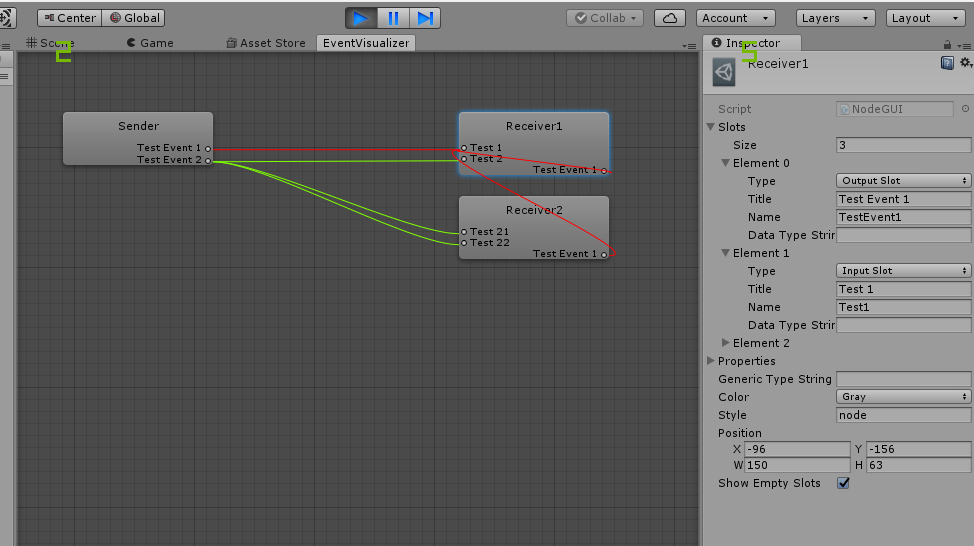unity3d.eventmanager v1.1.1
EventManager
A type-safe event system for Unity3D based on the event listener pattern. Original blog article http://saltydog.digital/usage-pattern-for-a-type-safe-unity-event-system/
The code in this repository is a minor variation with added examples and tests of the event system originally described here: http://www.willrmiller.com/?p=87
Features
EventManager is useful when you want to keep your codebase loosely coupled. Publishers and subscribers don't need to know anything about each other. EventManager is not a solution for exposing callbacks in the Unity Editor, Unity's own EventSystem may be more appropriate for that use case.
- Loosely coupled
- Type-safe
- Avoids breaking changes when new event parameters are added
EventManager includes a graphical EventVisualizer that shows how your classes are connected during runtime

Installation
Install the source or build a DLL.
Option 1: Source Installation
Copy the Assets/EventManager folder to your project's Assets folder.
Source and Unit Tests
NOTE: Unit tests are stored in an 'Editor' folder so they are not added to your build
mkdir tmp
cd tmp
git clone https://github.com/robertwahler/EventManager
cp -R EventManager/Assets/EventManager ~/your_unity_project/Assets/Examples (optional)
cp -R EventManager/Assets/Examples ~/your_unity_project/Assets/EventManager/Record Version SHA (optional)
git --git-dir=./EventManager/.git log --pretty=format:%h -1 > ~/your_unity_project/Assets/EventManager/VERSIONOption 2: DLL Installation
Create a DLL and copy it to your Assets folder. These instructions expect the
standard Mono mcs compiler. If you need it on OS X, you can install it with
HomeBrew brew install mono
mkdir build
mcs -recurse:'Assets/EventManager/Source/*.cs' \
-lib:/Applications/Unity/Unity.app/Contents/Frameworks/ \
-lib:/Applications/Unity/Unity.app/Contents/Frameworks/Managed/ \
-r:UnityEngine \
-r:UnityEditor \
-target:library \
-out:build/SDD.EventManager.dll
mkdir Assets/Lib
cp build/SDD.EventManager.dll ~/your_unity_project/Assets/Lib/Option 3: Installation via NPM
To install via NPM the following is needed:
- Install the Node.js package manager
- In your Unity-project run
npm install --save unity3d.eventmanager Extend your
.gitignore(or whatever else you're using)- Add
node_modules - Add
package-lock.json - Add
Assets/packages/ - Add
Assets/packages.meta
- Add
You can also add a package.json to your Unity project that contains the following content:
{
"dependencies": {
"unity3d.eventmanager": "1.1.0"
}
}This way you can define what dependencies you need in a reproducible way.
Testing
The NUnit test framework is included in Unity 5.3 and higher. Tests require installation of the UnityTestTools asset for Unity 5.2 and lower.
Running tests from Unity IDE
There is no Unity hotkey for running tests. Instead, manually use this menu sequence:
Main Menu: Window, Editor Tests Runner
Editor Tests: Run AllRunning tests from the command line
All command line test scripts require a Ruby Thor scripting environment with Ruby > 2.0. These commands are configured for execution on Mac OS X. Other environments will need to modify the Ruby source in the ./tasks folder.
gem install bundler
bundle installUsing Unity to run the tests (SLOW)
You need to shutdown the Unity IDE to run this command.
thor test:unitUsing NUnit-console (FAST)
The Unity IDE can be running.
thor test:nunitUsing Guard and the NUnit-console (CI)
This command will watch for file changes and automatically run the unit test suite. The Unity IDE can be running.
bundle exec guardSyntax checking with Vim
Do you use Vim instead of MonoDevelop/Visual Studio? Install https://github.com/neomake/neomake and add this to your .vimrc
let g:neomake_cs_mcs_maker = {
\ 'args': ['@.mcs'],
\ 'errorformat': '%f(%l\,%c): %trror %m',
\ }Usage
See Assets/Examples
License
MIT, see ./LICENSE for details.